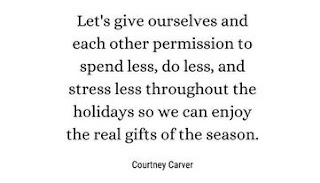Blog 6: The Power of YOUR Breath!
Happy October!!!
Hope this blog finds you all well!
This blog is about our BREATH! A very powerful tool that we do subconsciously every day to keep us living! I personally forget sometimes that my breath is powerful, especially in high anxiety moments. As you know, we all have defense responses of fight, flight, or freeze when we feel scared, angry, sad, or anxious. How wonderful would it be to rely on our breath to bring our cortisol levels down in those high emotional times?
Let's first review how to breathe.... yes, it may seem like a silly question, but I for one, learned a few years that I was breathing WRONG!
So, take a quiet moment and focus on your breath. Put one hand on your belly and one hand on your chest. Become aware. Take notice if your chest rises and falls. Does your belly rise and fall? Now take a big inhale through your nose...which rises or gets bigger - your belly or your chest??? Very important question here! The answer should be your belly.
Are some of you stunned??? I was! My mom actually taught me how to breathe during a panic attack when I was much younger. She noticed my chest rising and falling and I was unable to bring my cortisol levels down. She said, "try inhaling through your belly. Make your belly big, then slowly breathe out of your mouth." I did that, again and again, until I slowed my breathing and felt a sense of calm in my belly and my whole body. I cannot believe I was breathing wrong for so many years! Kinda embarrassing lol! But if you think about it, if you have taken care of an infant, you watch their bellies rise and fall to ensure they are still breathing, so why do we lose that growing up!?!?!? I am going to blame stress, in addition to the parasympathetic nervous system (fight, flight, freeze response), basically any high emotional state can cause our bodies to be out of whack. And that is why paying attention to our breath is so important. It is almost like you want to do a "breath check" several times a day!
Let's practice Diaphragmatic breathing (breathing from your belly): Place one hand on your chest and the other on your abdomen. When you inhale deeply, focus on expanding your abdomen (the hand on your belly) rather than your chest. This ensures that you are using your diaphragm and engaging in deep, beneficial breathing. If lying down, I like to put a small pillow on my belly and watch it rise and fall, which then feels like a meditative practice.
*It is VERY important to practice this belly breathing, as it can have a profound impact on your overall health and well-being AND be your #1 support while having high emotions, including an anxiety or panic attack. A great time to practice is when you wake in the morning. Before you get out of bed and your mind starts to wander about all the things you need to do, stop, don't get out of bed! Lay flat, put your hand on your belly and practice. Have a mindful moment. I promise you, it will set a wonderful tone to your day. Then, when you get into bed at night, and turn off the light and ready to fall asleep, do it again. It will help you fall asleep faster and in a more relaxed state.
What are the other powers of our breath:
- more efficient oxygen exchange in the lungs. When you breathe deeply, your diaphragm contracts and moves downward, expanding the lungs fully and allowing more oxygen to enter. Breath provides an oxygen supply to your body's cells - pretty amazing!
- like I have mentioned above breathing reduces stress and anxiety by stimulating the parasympathetic nervous system, which counteracts the fight, flight, or freeze response, leading to a sense of calm and relaxation in addition to lowering your heart rate and blood pressure - yes please! Anyone notice when we have high emotions or anxiety, that our heart beats faster and our blood pressure is probably sky rocketing? Belly breathing will help you become more emotionally and physically regulated. If you are feeling like your heart is racing, or your body is tensing, or anxiety rising, pause, and breathe, and see the power of your breath.
- Improved Lung Function: Regular diaphragmatic breathing (belly breathing) can improve lung function by strengthening the diaphragm muscle and increasing lung capacity. This is especially beneficial for individuals with respiratory conditions like asthma or chronic obstructive pulmonary disease (COPD). I have to say breathing through the belly saved my husbands life when he had covid in addition to a miracle. He laid on his belly due to not getting enough oxygen and belly breathed for hours and hours, and slowly but surely, he recovered. I truly believed that belly or diaphragmatic breathing saved his life.
- Enhanced Focus and Concentration: centers your mind and reduces distractions, making it useful for tasks that require focus and attention, which I know we all have several tasks that need our attention.
- Better Digestion: I have talked in previous blogs about nutrition and how eating the right foods can help manage symptoms of anxiety and depression. During your next meal, try to practice mindful eating. Take in the smells, the taste, the feel and really appreciate the food in front of you and breathe. See if you notice a difference with indigestion, bloating, and abdominal discomfort.
- Pain Management: After the birth of my first child, I was in a lot of pain for about 2 years. But as you know, life doesn't stop while you are in pain. I had to continue taking care of my child and work. So, along with many other tools, deep breathing became such a valuable tool for managing my pain, even if there were tears along with it! I also learned during that time that deep breathing can help reduce perceived pain levels by promoting relaxation and releasing endorphins, which are natural painkillers!! See - we have natural pain killers in us already, we just need to access it!!!
- Mind-Body Connection: It is very important to practice connecting our mind with our bodies and vise versa, and belly breathing fosters this connection. It encourages you to become more aware of your breath and the sensations in your body, promoting mindfulness and self-awareness.




Comments
Post a Comment